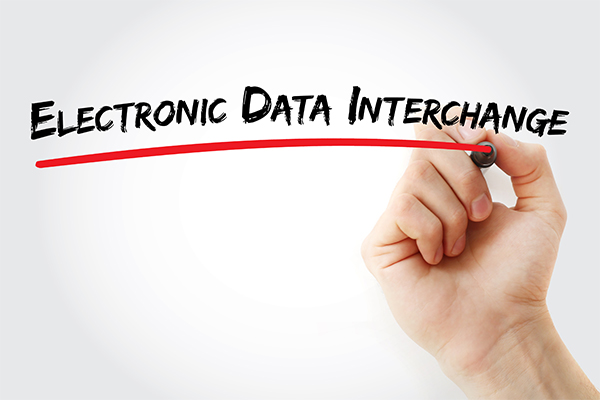Let's Talk !

As overwhelming numbers of businesses ditch paper for good, they demand a new method of communication. Electronic Data Interchange, or EDI, describes the various processes, protocols, and frameworks that modern enterprises use to disseminate and share vital operating information. EDI integration is a critical software enhancement that lets companies put these forward-thinking business strategies to good use.
How can you rethink the way you leverage EDI software to run a more streamlined, efficient operation? Here are some easy steps to embark upon as you make your journey toward full integration.

ERP, or enterprise resource planning, is vital to sustained growth. As business processes become increasingly complicated, they naturally grow harder to peer into, so ERP exposes the underlying threads for your easy perusal.
This isn’t to say that resource planning tools are flawlessly transparent. For instance, if your ERP system fails to relate factors like consumable material usage or facility operating practices to the bottom line, it’s harder to make cost-relevant decisions based on the information.
Integrating your EDI and ERP viewpoints helps you harmonize your outlook on productivity. For instance, being able to exchange documents with your resource partners and tie these records to specific product lifecycle events makes it simpler to troubleshoot imperfect production processes. Custom EDI software systems handle the grueling tedium of recordkeeping, liberating you to concentrate on using the data your enterprise generates for higher purposes.

Integrating your EDI tools and ERP systems might check the insidious spread of fallout from human error. These software frameworks can be programmed or configured to follow complex workflows. As such, their users gain enhanced power to skip time-consuming, mistake-riddled processes, such as manual data entry and receipt intake.
Custom EDI software systems also enable you to maintain more consistent ERP standards. For instance, a dashboard that automatically translates unique order and invoice data into records that your accounting backend can consume eliminates a fundamental technical obstacle. These tools also leave your team members with fewer excuses to deviate from accounting best practices.
One major hurdle to streamlining corporate operations is getting everyone on the same page. Even if you successfully train your workers to jump through hoops, you’ll be hard-pressed to get your supply chain partners marching in step.
With an EDI integration, you can overcome this barrier via efficient onboarding. By helping you set the tone of your collaborations from the start, it makes misunderstandings far less likely.

EDI tools come in many flavors, but their adherence to common standards unifies them. Although practices like agreeing on file formats, transmission schedules or security rules might seem trivial, they go a long way toward staving off mishaps.
Working with supply chain partners is often a frightening waltz of trial-and-error. While some suppliers might seem to offer great benefits, you never know if their business practices might come to represent untenable overhead down the line.
EDI systems that integrate with onboarding tools grant you more profound viewpoints. They give you a broader framework for planning collaborative undertakings and collecting performance metrics. Should a partnership eventually prove unsatisfactory, you’ll have the data to know why — making it easier to convince your leaders that it’s time to move on or take your deficient partners to task.
Integration software’s focus on data also proves beneficial for companies that want to expand in an orderly, duplicable fashion. By letting you construct digital twins or virtual models of essential processes, EDI tools enhance your ability to forecast changing market conditions and devise viable responses. Without these insights, it’s much more challenging to establish a baseline for comparison.
EDI lets companies cut through the complexities of tracking parts, resources and orders. These systems show you precisely what’s happening in the fulfillment lifecycle at any given moment, and such benefits can improve your customer service prowess.
Modern consumers have all but come to expect last-mile features, such as fined-grained delivery tracking and updates. While bigger retailers can easily deploy these products, offering similar perks would be impossible for many small-to-medium-sized businesses without EDI data.
EDI exchange is also the law of the land for supplier partners, such as the countless order fulfillment and delivery companies that promise to help you please consumers. Getting your enterprise up to speed with modern transaction data systems could be the last obstacle that stands between you and more efficient partnerships.

EDI managed services help link decision-making processes to real-world circumstances. For instance, having more feedback at your fingertips will positively influence the way you structure partnerships. Understanding more about the journeys that goods take through lading, customs, billing and inventorying can make it easier to root out inefficiencies.
The benefits of switching to a superior EDI integration have a lot to do with the nature of digital business data exchange. As electronic documents that supersede everything from faxes to email, these records unify the way you manage the information that powers your success. By standardizing data interchange formats, they eliminate the filter of overly complex workflows. They also make it quicker to glean knowledge from your actions, which is critical to performance indicator accuracy.
Systems that integrate EDI software with accounting and ERP frameworks help you reshape your organization into the enterprise you dream of becoming. They make it easier to view critical processes from a top-down perspective and see the ramifications of your leadership choices. In the process, these powerful assets empower you to build a far more responsive business entity.
Disclaimer:
Chetu, Inc. does not affect the opinion of this article. Any mention of specific names for software, companies or individuals does not constitute an endorsement from either party unless otherwise specified. All case studies and blogs are written with the full cooperation, knowledge and participation of the individuals mentioned. This blog should not be construed as legal advice.
Chetu was incorporated in 2000 and is headquartered in Florida. We deliver World-Class Software Development Solutions serving entrepreneurs to Fortune 500 clients. Our services include process and systems design, package implementation, custom development, business intelligence and reporting, systems integration, as well as testing, maintenance and support. Chetu's expertise spans across the entire IT spectrum.
- See more at: www.chetu.com/blogs
Privacy Policy | Legal Policy | Careers | Sitemap | Referral | Contact Us
Copyright © 2000-2024 Chetu Inc. All Rights Reserved.
